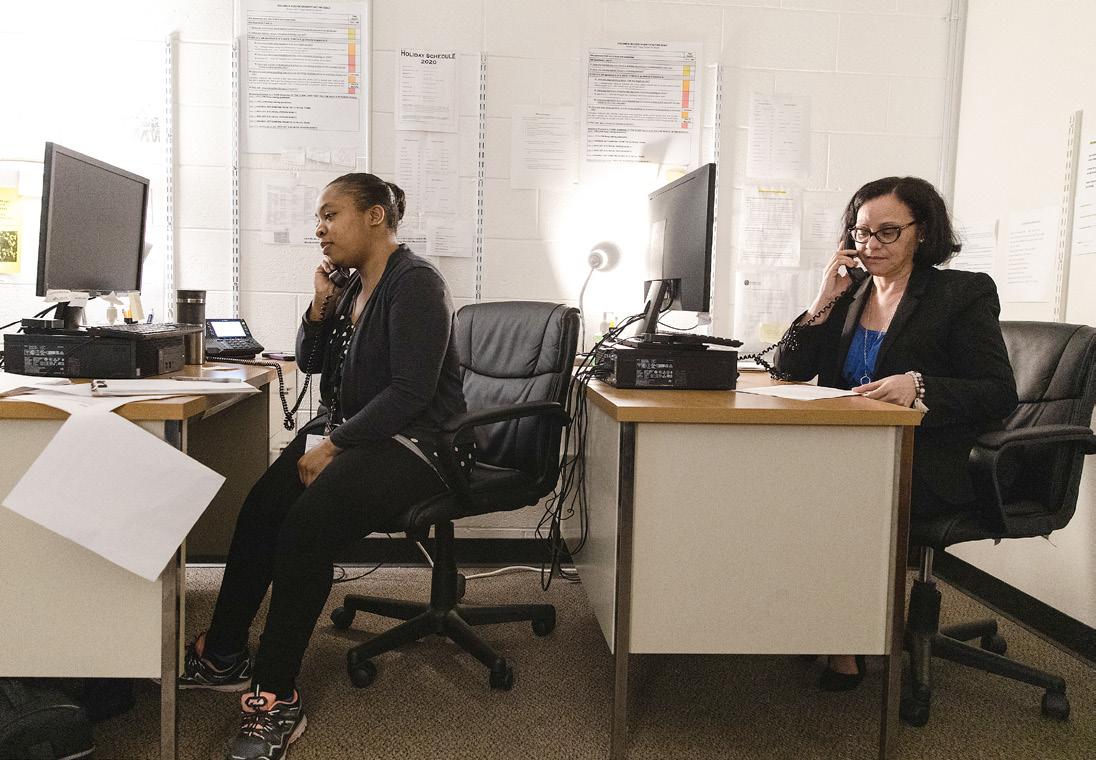
4 minute read
Pandemic raises workload for mental health agencies
BY ELIZABETH GRAHAM | Graham@PBN.com
During the first week of March at the BH Link call center in East Providence, about 3.5% of the roughly 40 calls that came in daily were related to the coronavirus crisis.
Advertisement
By the second week, nearly 19% of callers were having trouble dealing with some aspect of the public health emergency.
Established in late 2018, the state-run call center, overseen by the R.I. Executive Office of Health and Human Services and the R.I. Department of Behavioral Healthcare, Developmental Disabilities and Hospitals, fields calls from people experiencing some sort of mental health or behavioral health need or crisis.
Right now, it’s anxiety that’s behind many of the calls, said Ben Lessing, CEO and president of Community Care Alliance, which operates BH Link in a partnership with Horizon Healthcare Partners.
“We have definitely seen … an uptick in terms of calls relating to the virus,” Lessing said.
Daily calls spiked to 60, well over the usual 40, on one day in late March as the number of cases statewide shot up as well. DURING
Callers are asking question such as, How do I manage this? What do I do? Who do I listen to?
“It’s sort of a combination of ‘How do I get through this and manage my anxiety at the same time?’ ” Lessing said.
As the coronavirus pandemic continues to unfold, with rising numbers of infections in Rhode Island and neighboring states, people who are already living with mental health issues or struggling with addiction are particularly vulnerable, said BHDDH acting Director Kathryn Power.
Included in the state’s response to the public health crisis, BHDDH is part of the R.I. Emergency Management Agency’s broad-reaching mobilization that went into effect in February.
“This disaster is causing massive amounts of isolation and massive amounts of time in which people have to withdraw from their normal social environments,” Power said. “For people with substanceuse disorders or mental illnesses, it’s hugely important that we keep them connected to some kind of network, some kind of social opportunity. Because we still have an opioid epidemic going on … and we don’t want those individuals to lose traction, to lose faith in their own recovery.” But along with the rest of the economy, the health care industry is taking a financial hit from the virus.
Some appointments are canceled and other patients, unreceptive to telemedicine and wanting to limit close contact with others, pull back from treatment.
In order to help keep community mental health resources in place, BHDDH is easing some restrictions on staffing requirements, creating Medicaid waivers to pay for virtual visits and reconfiguring resources under federal and state law, Power said.

GROWING CONCERN: Crisis phone screeners Alechi Wali, left, and Lydia Villafana take calls at the state-run BH Link call center in EastProvidence. The center, which fields calls from people experiencing amental health or behavioral health need, has seen calls related to theCOVID-19 pandemic increase in recent weeks. / PBN PHOTO/RUPERT WHITELEY
“We want those providers to stay operational because we’re anticipating that this environment of fear will continue to contribute over the longer term to behavioral health concerns and conditions,” she said.
BH Link, which also accepts walkin patients on a limited basis, joins other mental health providers across the state that are either remaining open or offering virtual visits.
While most of the established patients at Newport County Community Mental Health Center Inc. have adjusted well to telephone “visits,” the community mental health organization is also turning its attention to residents who may be asking for help for the first time.
“We’ve now rightfully instructed thousands of people to isolate themselves, and 25% of people in Rhode Island live alone. To be further isolated – things can happen when people are lonely or scared,” said Jamie Lehane, Newport Mental Health CEO and president.
Often, simply allowing a person who is upset to let their feelings out makes a significant difference, Lehane said.
Newport Mental Health is also a member of Horizon Healthcare Partners, which includes Thrive Behavioral Health Inc., Tides Family Services Inc. and CODAC Inc.
All members are continuing to offer mental health and addiction treatment during the pandemic.
At Newport Mental Health, volume at its call center has been down, prompting Lehane to speculate that residents may assume the organization is closed.
That won’t be the case for any Horizon Healthcare members, according to spokeswoman Karen Jeffreys. The agencies “will remain open due to the essential behavioral health services they provide,” she said.
Call center staff at BH Link are fielding anxiety-driven questions, but also queries about practical things, such as proper social distancing and how best to clean. Talking through those issues can be important, because knowing what actions to take can impart a sense of control, Lessing pointed out.
“Because of social media, the compressed news cycle, the internet, there’s a lot of information and a lot to process,” he said. “The other thing we’re trying to do is to slow that down. We’re advising people to back away from some of their social media. We need people to really pay attention to scientific information.”

